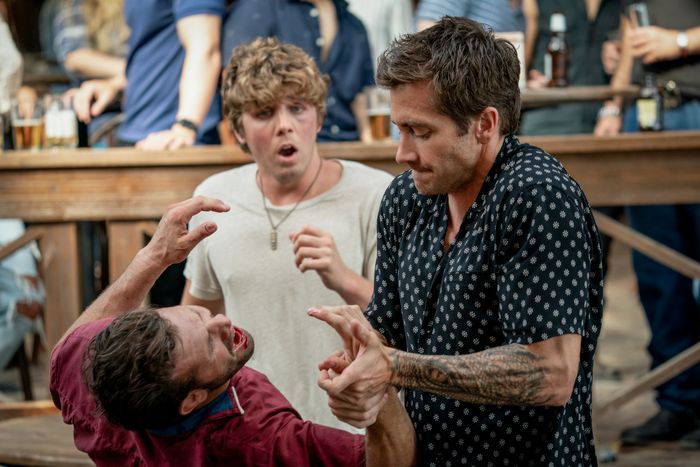
As an avid consumer of violence onscreen, I’ve got to hand it to the new Road House for never looking back once it gives into havoc. The 1989 original, which starred Patrick Swayze alongside Patrick Swayze’s magnificent mane of hair and Patrick Swayze’s oiled-up chest, pretended to be about its main character Dalton’s triumph over his own savage impulses while working as a bouncer in Jasper, Missouri. Obviously, though, it was also about how badass it was when he tore a guy’s throat out with his bare hands. The 2024 edition, which casts Jake Gyllenhaal as an even more ripped (but down on his luck) version of the same character, doesn’t bother with restraint. Sure, this Dalton is a former UFC fighter who’s wracked with guilt over having killed an opponent in the ring. It’s why he reinvented himself as a smiley drifter who lives out of his car until he gets an offer from a stranger named Frankie (Jessica Williams) for a job at her bar in the Florida Keys. But when he does give into his rage, it’s with a feeling of “finally” rather than any show of “oh no.” Nü-Road House believes that its audience is there for pandemonium rather than philosophy, and you know what? It’s not wrong.
That lack of enlightenment makes the Road House remake pretty inept in terms of replicating the spirit of the original. It keeps the basic bouncer-versus-shady-businessman setup while leaving all of the weirder, more interesting details behind. (No half-considered homoeroticism or mention of any traveling circuit of semi-famous “coolers” who get troubled honky-tonks under control.) But whatever — director Rowdy Herrington’s ’80s standard may have been brute forced into the cult canon by repeated plays on cable TV, but it’s hardly a sacred text. The new movie, helmed by Doug Liman, is really a naked attempt to capitalize on MMA fandom, with one of the sport’s most toxic stars, Conor McGregor, making his acting debut as henchman Knox. And yet, despite the mercenary nature of its existence, Road House is better than it has any right to be — perfectly enjoyable schlock that’s helped along by how unserious it is. Rather than enshrine mixed martial arts as a macho achievement, Liman approaches it and the film’s action sequences like a live-action Looney Tunes, in which the prospect of sustaining actual physical damage seems distant until it abruptly is not. When he’s not flinging characters through furniture or off boats, he’s flinging the camera around in an effort to make the movie’s brawls look more dynamic.
Honestly, they could use the help. MMA may be brutal, but it’s not the most innately cinematic of approaches to combat, and Road House can’t quite hide that by whirling its lens dizzyingly through space and dropping into the occasional POV shot. It’s the fight-adjacent stuff that’s most compelling — the showdowns on bridges and chases on water, as well as the frequent and disarmingly effective bits of humor. Gyllenhaal’s always been better at oddballs than straightforward heroes, and the secret of Road House’s success is that his Dalton is one of the former. When the character’s introduced, he’s making the rounds in an underground fight circuit. Instead of seeing him in action, we see him take a knife to the gut in the parking lot, an indignity he reacts to with the aggrieved stoicism of Daffy Duck replacing his beak after it’s been shot out of place. Dalton later insists on driving the crew of motorcycle-riding troublemakers he just beat up to the hospital, uttering “bump” as a courtesy warning every time he’s about to hit a pothole. When the ER doctor (Daniela Melchior) he meets there takes him out for a boat ride, he tries to scurry away like a Victorian maiden caught without a chaperone when he realizes they’re on a date.
The movie does sidle into a plot involving a corrupt local scion named Ben Brandt (an appropriately cartoonish Billy Magnussen) who’s been buying up land on the island to build a resort, and who’s now targeting Frankie, the last holdout. But Ben and his hired goons, who include in their number a scene-stealing Arturo Castro, don’t offer much by way of real intimidation, which is why the movie arranges for Knox to blow into town as an agent of chaos hired by Ben’s incarcerated dad. McGregor’s a forceful if entirely one-note presence onscreen whose main performance concept is a manic beam. When placed alongside Dalton’s habitual I’m-harmless grin, it gives the last act an amusing air of forced cheer. Here they come, the smiling men, for a finale that’s genuinely vicious but that also made me shriek with laughter at its outrageousness. It may not be able to replicate the accidental majesties and odd undercurrents of the first movie, but the new Road House is funny, and that ends up being enough.
More Movie Reviews
- The Accountant 2 Can Not Be Taken Seriously
- Another Simple Favor Is So Fun, Until It Gets So Dumb
- Errol Morris Has Been Sucked Into the Gaping Maw of True Crime


